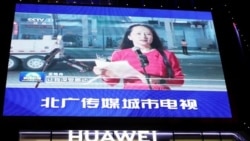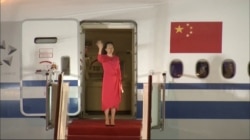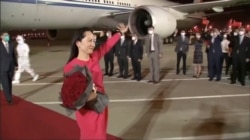On September 24, Meng Wanzhou, a top financial executive with the Chinese telecommunications firm Huawei, returned to China after nearly three years of house arrest in Canada.
Earlier that day, Meng had made a virtual appearance in a U.S. courtroom under a so-called deferred prosecution deal with the U.S. Department of Justice (DOJ), under which she admitted to misleading the British bank HSBC about Huawei’s business activities in Iran.
Meng did not have to plead guilty as part of the deal. If Meng adheres to its conditions, a U.S. criminal indictment against her could be dismissed in December 2022.
Meng received a hero’s welcome upon returning to China, with her release framed as a diplomatic victory for the “strong motherland.”
“It has long been a fully proven fact that this is an incident of political persecution against a Chinese citizen, an act designed to hobble Chinese high-tech companies,” Chinese Foreign Ministry Spokesperson Hua Chunying said upon Meng’s arrival in China on September 25.
“The so-called ‘fraud' charges against Ms. Meng Wanzhou are purely fabricated,” Huashe said.
That claim is false. While it ultimately is up to a court to determine guilt, the U.S. has put forward compelling evidence pointing to Meng’s complicity, including documents and a series of on-the-record incidents.
This evidence wasn’t “fabricated.” Huawei, meanwhile, has not made public evidence it says disproves the accusations against Meng and the company.
First, some background.
Canada’s arrest of Meng in 2018 at the request of the United States threw already rocky U.S.-China relations into a tailspin, with Ottawa caught in the middle. China imprisoned two Canadians on charges of espionage, which Canada and its allies decried as “hostage diplomacy.”
The Canadians, former diplomat Michael Kovrig and businessman Michael Spavor, were released just hours before Meng’s departure from Vancouver. Some Western media have framed the events as an “apparent prisoner swap.” Two U.S. citizens who'd been barred from leaving China also were subsequently sent home.
Beijing and Washington deny the releases are connected. But Beijing has characterized Meng as a hostage in a U.S. plot to prevent China’s rise.
Although Meng did not plead guilty, she did acknowledge the Justice Department’s Statement of Facts underpinning the fraud charges to be “true and accurate to the best of her information and belief.”
That was one condition of the deferred prosecution deal.
“In entering into the deferred prosecution agreement, Meng has taken responsibility for her principal role in perpetrating a scheme to defraud a global financial institution,” the DOJ said in a September 24 statement.
The institution is HSBC, where both Huawei and Skycom, a Hong Kong shell company the U.S. maintains was controlled by Huawei, held bank accounts. HSBC conducted transactions in U.S. dollars for Huawei.
The DOJ alleges Meng led HSBC to believe that Skycom was only a partner of the Chinese tech giant. Meng misled HSBC into approving millions of dollars in transactions with Skycom from 2010 to 2014 to support Skycom’s Iran business, in violation of U.S. sanctions, the agency alleged.
That included at least $7.5 million in transactions to pay Iran-based contractors to work with Iranian telecommunications service providers.
Reuters reported in December 2012 and January 2013 that Skycom’s Tehran office offered to sell embargoed U.S.-made computer gear to Iran’s largest mobile-phone operator in late 2010. Reuters also unearthed documents showing Skycom’s close ties with Huawei.
Huawei responded to Reuters that the deal did not go through and insisted that Skycom was just one of its “major local partners.”
HSBC, along with other Western banks, questioned Huawei’s relationship with Skycom following Reuters’ findings. Huawei again stated that Skycom was its business partner in Iran.
In August 2013, Meng made an in-person PowerPoint presentation to an HSBC senior executive in Hong Kong to address the Reuters reports.
Meng stated, according to the DOJ, that Huawei’s relationship with Skycom was “normal business cooperation,” and reaffirmed Skycom as a “business partner of Huawei” and a “third party” that Huawei “works with” in Iran. Meng told the HSBC executive that Huawei, once a shareholder of Skycom, had “sold all its shares in Skycom.”
The DOJ called Meng’s statements to HSBC untrue, saying that Huawei actually controlled Skycom.
All significant Skycom business decisions were made by Huawei. Moreover, Skycom’s country manager – the head of the business – was a Huawei employee. Individuals employed by Skycom believed they worked for Huawei, the DOJ said.
Skycom’s annual return, filed in May 2007, showed the company became wholly owned by Hua Ying Management Co Ltd. in February 2007, Reuters reported. According to Hua Ying’s filings, its shares were owned by Huawei’s parent company, Shenzhen Huawei Investment & Holding Co Ltd. The record also showed that Meng was then Hua Ying’s secretary.
In November 2007, instead of selling “all its shares in Skycom,” Huawei transferred Skycom’s ownership to Canicula Holdings Ltd., a company which was also controlled by Huawei, the DOJ said.
Skycom corporate records also showed that Meng served on its board of directors, which consisted of Huawei employees, between February 2008 and April 2009. As Reuters reported in 2013, several past and then current Skycom directors appeared to be Huawei employees. The individuals both had Huawei email addresses and were in Huawei’s employee directory.
After receiving the English version of Meng’s PowerPoint presentation in Hong Kong, HSBC continued business with Huawei. The DOJ concluded that it was Meng’s misrepresentation of the nature of Huawei’s business in Iran that tricked HSBC into providing services to and continuing a business relationship with Huawei in violation of U.S. sanctions.
Meng’s lawyers contest this narrative.
Huawei and two Huawei affiliates — Huawei Device USA Inc. (Huawei USA) and Skycom Tech Co. Ltd. (Skycom) — were indicted at the same time that Meng was charged. Their indictment was unsealed in January 2019.
According to the DOJ, “Huawei and Skycom are charged with bank fraud and conspiracy to commit bank fraud, wire fraud and conspiracy to commit wire fraud, violations of the International Emergency Economic Powers Act (IEEPA) and conspiracy to violate IEEPA.”
One condition of Meng’s deferred prosecution deal requires that she not contest the U.S. government’s claim that she played a “principal role in perpetrating a scheme to defraud a global financial institution (HSBC).”
Questions remain over how Meng’s admission will affect the cases against Huawei and Skycom. Outside legal experts argue that Meng’s admission might not stand up in court.
Juan Morillo, co-chair of the White Collar and Corporate Investigations Practice in Washington, D.C., told Reuters that Huawei could argue Meng’s deal was the “product of extortion,” in that she only signed it to gain freedom.
Likewise, the company can say it neither signed nor is bound by the deal.
“I've been in cases similar to this, and that's what the strategy is going to be with Huawei,” Morillo said. “They'll say, ‘This is a fabrication. This is the product of extortion, and it has no binding effect on us at all.’”
Another New York-based attorney, Charles Stillman, told Reuters that Meng’s agreement with prosecutors will not hold weight unless she testifies against Huawei.
That corresponds with the 6th Amendment of the U.S. Constitution., which grants the accused the right “to be confronted with the witnesses against him.”
“If she does not come back (to the United States), and no one has the opportunity to cross-examine her, it is inadmissible,” Stillman said.
In June, Meng’s lawyers said U.S. claims that she fraudulently misled HSBC are themselves “false and misleading.” They said their case is borne out by documents, including emails and other HSBC records, showing “there is no evidence of fraud on HSBC.”
“[The documents] show that Huawei's control over Skycom was not kept from senior HSBC executives; that the continuing nature of Skycom's business with Huawei in Iran was not kept from senior HSBC executives; that internal HSBC risk-assessments were made based on knowledge of the true facts; and that any reputational risks were managed with the knowledge of senior HSBC executives,” the statement read.
Those documents are not publicly available. Meng's lawyers sued HSBC to gain access to the papers, first in London, and then in Hong Kong.
According to Britain’s Guardian newspaper, the company had reached a settlement with HSBC, under which Huawei apparently gained access to the materials “with a confidentiality clause attached.”
However, in proceedings over Meng’s extradition from Canada to the United States, a judge did not allow the documents to be used.










